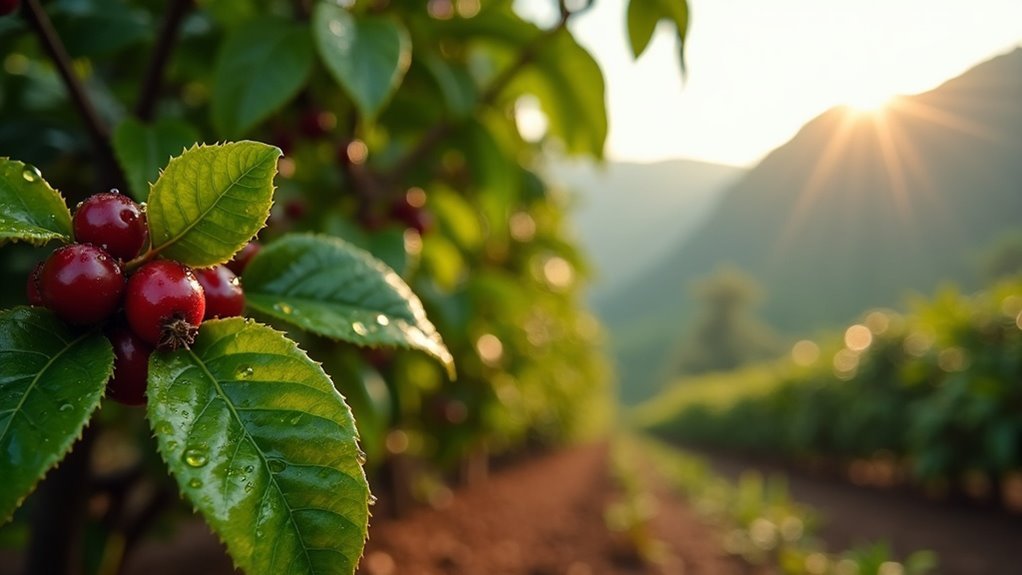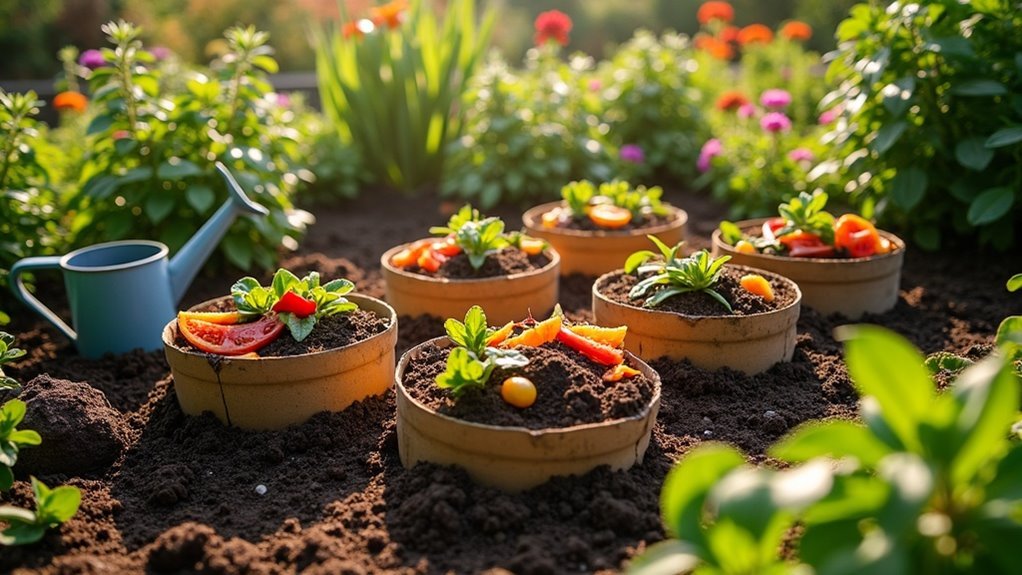F1 hybrid coffee is produced by crossing two distinct Arabica varieties, leading to plants that yield 22-47% more than traditional types. These hybrids exhibit enhanced resilience against diseases and environmental changes, resulting in quicker maturation and earlier harvests. Although they require specific management practices and cannot be seed-saved, their genetic diversity improves the adaptability of coffee production. This innovative approach offers significant benefits, and there is much to learn about the challenges and future prospects of F1 hybrids in the coffee industry.
Key Takeaways
- F1 hybrid coffee is created by crossing two distinct Arabica varieties, resulting in new, high-performing coffee plants that offer unique flavor profiles and characteristics.
- These hybrids showcase hybrid vigor, producing 22-47% more coffee than traditional varieties, with an average yield increase of 28%, making them an attractive option for coffee farmers.
- They mature quickly, allowing for first harvests within just two years, which helps optimize production efficiency to meet the rising demand for quality coffee.
- F1 hybrids contribute to enhanced genetic diversity in coffee crops, improving resilience against diseases and environmental changes, which is essential for sustainable coffee farming practices.
- The adoption of F1 hybrid coffee requires careful management practices and financial support, as farmers cannot save seeds due to the unpredictable traits of subsequent generations.
Understanding F1 Hybrid Coffee
F1 hybrid coffee represents a significant advancement in coffee cultivation, achieved by crossing two distinct Arabica varieties.
These F1 hybrids exhibit hybrid vigor, resulting in yields 22-47% higher than traditional varieties. They also demonstrate resilience against diseases and climate changes, making them essential for sustainable coffee production.
F1 hybrid coffee varieties showcase hybrid vigor, yielding 22-47% more than traditional types while resisting diseases and climate fluctuations.
However, it’s important to note that F1 hybrids don’t produce consistent offspring in subsequent generations, necessitating clonal propagation. This process can be costly and time-consuming.
Despite these challenges, F1 hybrids play a critical role in enhancing genetic diversity within Arabica, addressing the increasing demand for coffee and the threats posed by climate change.
The Importance of Genetic Diversity
Genetic vulnerability in coffee plants poses significant risks to crop health and productivity.
By exploring the benefits of diverse coffee varieties, you can understand how increased genetic diversity enhances resilience against diseases and environmental changes.
Embracing new genetics, such as F1 hybrids, is essential for securing a sustainable future in coffee production.
Genetic Vulnerability in Coffee
While many coffee enthusiasts relish the rich flavors of their favorite brews, they mightn’t be aware that the plants behind those beverages face significant genetic vulnerabilities.
Coffea arabica, for example, has a narrow gene pool, resulting in 98.8% genetic similarity among its varieties. This lack of genetic diversity makes the coffee plants more susceptible to threats such as coffee leaf rust, which can devastate crops globally. Traditional seed-saving practices further entrench these vulnerabilities.
On the other hand, F1 hybrids are engineered to boost genetic diversity, providing adaptability and resilience against climate change. This innovation is crucial for safeguarding coffee production and ensuring the continuation of your cherished coffee experiences.
Benefits of Diverse Varieties
Diverse varieties of coffee plants are vital for ensuring the resilience of coffee production systems. By enhancing genetic diversity, coffee growers can significantly lower the risk of diseases and adapt to environmental changes, such as coffee leaf rust. F1 hybrids are especially beneficial because they incorporate traits from genetically distant parent plants, leading to improved yields and enhanced disease resistance. Ethiopia’s rich genetic resources serve as a valuable foundation for breeding programs aimed at developing resilient coffee varieties with exceptional cup quality.
| Benefit | Description |
|---|---|
| Disease Resistance | Increased resilience against various threats |
| Adaptability | Enhanced ability to adapt to changing environments |
| Quality Improvement | Sustains high cup quality in hybrid coffees |
Advantages of F1 Hybrids
F1 hybrids in coffee cultivation offer significant advantages, particularly in yield potential and disease resistance.
You can expect increases in productivity by 22-47% compared to non-hybrid coffee varieties, which greatly impacts your profitability.
Additionally, these hybrids demonstrate improved resilience against diseases and environmental challenges, making them a smart choice for sustainable coffee farming practices.
Increased Yield Potential
Given the increasing demand for coffee and the challenges posed by climate change, the adoption of hybrid coffee varieties presents a compelling solution for coffee farmers seeking to enhance their productivity.
F1 hybrids can yield 22-47% more coffee than traditional varieties, with an average yield increase of 28% observed in field tests across coffee-producing countries such as El Salvador, Costa Rica, and Rwanda.
These hybrids mature quickly, allowing for first harvests in just two years, enabling farmers to generate income faster. Additionally, their hybrid vigor fosters adaptability to environmental changes, leading to potential annual yield increases of up to 50%.
This makes F1 hybrids a strategic choice for optimizing coffee production and meeting the growing market demands.
Enhanced Disease Resistance
Hybrid coffee varieties not only boost yield potential but also provide significant advantages in disease resistance. By selecting F1 hybrids, you can enhance your coffee production while minimizing the risks associated with diseases.
Here are some key benefits:
- Robustness against diseases: F1 hybrids significantly reduce crop loss due to challenges such as coffee leaf rust.
- Higher yields: These hybrids can increase yield by 22-47% compared to traditional varieties.
- Adaptability: F1 hybrids thrive in various growing conditions, ensuring they remain healthy and resilient.
Investing in hybrid coffee varieties may lead to a more fruitful and sustainable coffee farming experience.
Yield and Quality Comparisons
While traditional coffee varieties have long been the standard in the coffee industry, recent advancements in F1 hybrid coffee varieties are reshaping yield and quality expectations. F1 hybrids can yield 22-47% more than non-hybrids and deliver an average increase of 28% over standard varieties. Remarkably, the Centroamericano hybrid scored an impressive 90.5 points in quality assessments, highlighting its exceptional potential. Additionally, these hybrids produce harvests within just two years, allowing for quicker income generation for coffee growers.
| Variety | Average Yield Increase | Quality Score |
|---|---|---|
| F1 Hybrids | 22-47% | 90.5 |
| Traditional Varieties | 0% | Varies |
| Standard Check | 28% | Varies |
Challenges in Cultivation
As coffee growers increasingly consider F1 hybrids for their higher yields, they must navigate several significant cultivation challenges unique to coffee production.
These include:
- The need for different management practices and increased nutritional inputs compared to traditional coffee varieties.
- Inability to save seeds for future planting due to unpredictable traits in the F2 generation, which poses financial risks for coffee producers.
- Higher maintenance costs, such as increased fertilizer application, which can deter some coffee growers.
These factors create uncertainty, especially since the consequences of planting F1 coffee seeds may not become evident until three years after planting, complicating decision-making for farmers.
Balancing these challenges is essential for successful F1 hybrid coffee cultivation.
Future Prospects for F1 Hybrids
The challenges faced by coffee growers in cultivating F1 hybrids highlight the need for careful consideration of their future prospects.
Expected to be commercially available by 2024, F1 hybrids like Starmaya and Centroamericano promise higher yields—22% to 47% more—along with disease resistance, enhancing productivity for coffee farmers amid climate change.
As production methods improve and costs decrease, broader access to these hybrids may emerge, making them an attractive option for many coffee growers.
Broader access to F1 hybrids may soon make them a compelling choice for coffee growers, especially as production costs decline.
Additionally, their consistent high cup quality could shift consumer preferences, driving demand and potentially stabilizing the coffee market as adaptation strategies evolve in response to climate challenges.
The Role of Farmers in Adoption
For coffee growers considering the adoption of F1 hybrid varieties, understanding the nuances of these new plants is essential.
Farmers must evaluate various factors before making the switch:
- The potential for increased yields of up to 50% can be enticing.
- Higher costs and the implementation of new management practices are significant considerations.
- Sourcing quality, clonally propagated seeds from trusted nurseries is crucial.
Education and communication are vital for grasping the benefits and risks associated with F1 hybrids.
Since saving seeds for future planting isn’t an option, collaborative efforts to provide financing and training will facilitate a smoother transition to these promising coffee varieties while ensuring sustainable practices.








